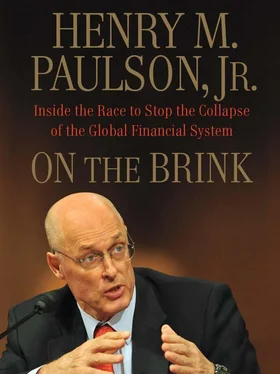As I finish this book, the G-20 has just completed another summit, in Pittsburgh, and has successfully pivoted from crisis management to macroeconomic coordination. Building on the principles and action plan for reform we established in Washington at the first G-20 summit, in November 2008, and on the results of the meeting in London in April 2009, the G-20 will now serve as the major forum at which leaders of developed and emerging markets address global financial and economic issues.
Although the preeminence of the G-20 leaders’ forum rightly gives the emerging-markets countries a greater voice, it is also clear that the strength of the relationship between the U.S. and China will be critical to the functioning of the G-20 and global cooperation. Global problems cannot be solved by the U.S. and China alone, of course, but agreement with China makes it much easier to make real progress on any major issue.
The G-20’s role in tasking and reviewing the work of the international financial bodies will be among its enduring contributions. The creation and expanded role of the Financial Stability Board (FSB), which comprises central bankers, finance ministers, and securities regulators, has been an important outgrowth of the G-20 process. The FSB will have the lead role in establishing the rules of the road for capital, liquidity, and financial products that will need to be implemented by national legislatures. And on politically sensitive matters such as compensation, the FSB has already shown an ability to develop nuanced and constructive proposals. Together with other international standards setters such as the International Organization of Securities Commissions (IOSCO), the Basel Committee, and the International Accounting Standards Board (IASB), the FSB must play a crucial role in ensuring that the G-20 reform agenda is implemented in a coordinated and cooperative way that leads to convergence rather than fragmentation. None of this takes away from the preeminent role of the U.S. in the world economy, but simply recognizes the vital fact of our interdependence.
While much progress has been made, real risks remain, including those of trade and financial protectionism. At each G-20 summit, the leaders condemn protectionism, but they do so against the backdrop of increasing political pressures at home that have resulted in a variety of measures that are inconsistent with their repeated pledges. The U.S.’s own commitment to trade liberalization remains in question. As I complete this book, no action has been taken on pending free-trade agreements, and no progress has been made on completing the World Trade Organization’s Doha round of multilateral trade talks.
In a world where virtually everyone agrees we have had inadequate regulation of banks and capital markets, there is a very real danger that financial regulation will become a wolf in sheep’s clothing, rivaling tariffs as the protectionist measure of choice for those nations that want to limit or eliminate competition not only in financial services but also in any other sector of their economy. Though this is not a new development, the risks are greater today because the U.S. model of capitalism appears more vulnerable than in the past, even as the economic crisis pushes nations toward short-term measures to protect jobs. One of the lessons of the Great Depression is that protectionist actions by industrial nations seeking to wall off their countries to protect their jobs and industries were self-defeating and made that awful downturn longer and more painful.
The European Union has already introduced regulation that mandates that certain securities can count toward regulatory capital only if their credit ratings are issued by an agency located in the EU. The EU proposal on alternative investment funds similarly would require fund managers to have established offices in the EU or operate under “equivalent” regulations; otherwise they would not be allowed access to the EU market. And the EU is requiring that credit default swaps be cleared through clearing parties located in its member states. As a result, a number of other countries have indicated that they are considering similar territorial restrictions.
The potential fragmentation is not limited to Europe. The U.S. has prohibited banks receiving certain federal funds from issuing H-1B visas to hire highly skilled foreign nationals, even though such people would add value to the economy. The February 2009 U.S. stimulus bill contained a “Buy American” provision that has led to similar protectionist language in other bills. Both federal and state officials are seeking to insert protectionist restrictions even where they are not required by law.
The best way to combat protectionism, whether by tariff or regulation, is with strong leadership from the U.S. We must keep our markets open for trade and investment, enact previously negotiated trade pacts, work toward a successful Doha round, and forge new trade agreements and investment treaties. We must also demonstrate our commitment to rebuilding our economy, fixing our regulatory system, and getting the government out of the private sector as soon as possible. The world needs to know that we are serious about reducing our budget deficit and cleaning up our other messes.
I am quite hopeful that we will put in place the necessary reforms for the financial system. There is finally a broad consensus among policy makers in the U.S. and internationally as to the causes of the crisis. I also remain optimistic about the economic future of the U.S. and its continued leadership role in the global economy. I don’t mean to minimize our troubles, but every other major country has more-significant problems. As the richest country on earth, with the biggest, most diverse, and most resilient economy, we have the capacity to meet our challenges. Though what happened over the past few years was a difficult chapter in our nation’s economic history, it is just one chapter, and there will be many more that are marked by economic gains and rising prosperity if we learn from our mistakes and make the necessary corrections.
If we don’t lose our sense of urgency, and if the needed reforms are put in place domestically and internationally, markets will adapt and continue their positive trend of the past 25 years. Let’s not forget that these markets helped tear down the Iron Curtain, lifted hundreds of millions of people out of poverty, and brought great prosperity to our nation. Efficient, well-regulated capital markets can continue to provide economic progress around the world. That inevitably leads to more political freedom and greater individual liberty.
ACRONYMS USED IN THE TEXT
ABCP: asset-backed commercial paper
AIG: American International Group
AMLF: Asset-Backed Commercial Paper Money Market Fund Liquidity Facility
ARM: adjustable-rate mortgage
ASF: American Securitization Forum
BofA: Bank of America
CDO: collateralized debt obligation
CDS: credit default swap(s)
CIC: China Investment Corporation
CPP: capital purchase program
ECB: European Central Bank
ESF: Exchange Stabilization Fund
FDIC: Federal Deposit Insurance Corporation
FHA: Federal Housing Administration
FHFA: Federal Housing Finance Agency
FSA: Financial Services Authority
FSB: Financial Stability Board
GAO: Government Accountability Office
GDP: gross domestic product
GSE: government-sponsored enterprise (Fannie Mae, Freddie Mac)
HERA: Housing and Economic Recovery Act
HUD: U.S. Department of Housing and Urban Development
IASB: International Accounting Standards Board
IMF: International Monetary Fund
KDB: Korea Development Bank
LIBOR: London Interbank Offered Rate
LIBOR-OIS: London Interbank Offered Rate–overnight indexed swap
Читать дальше












